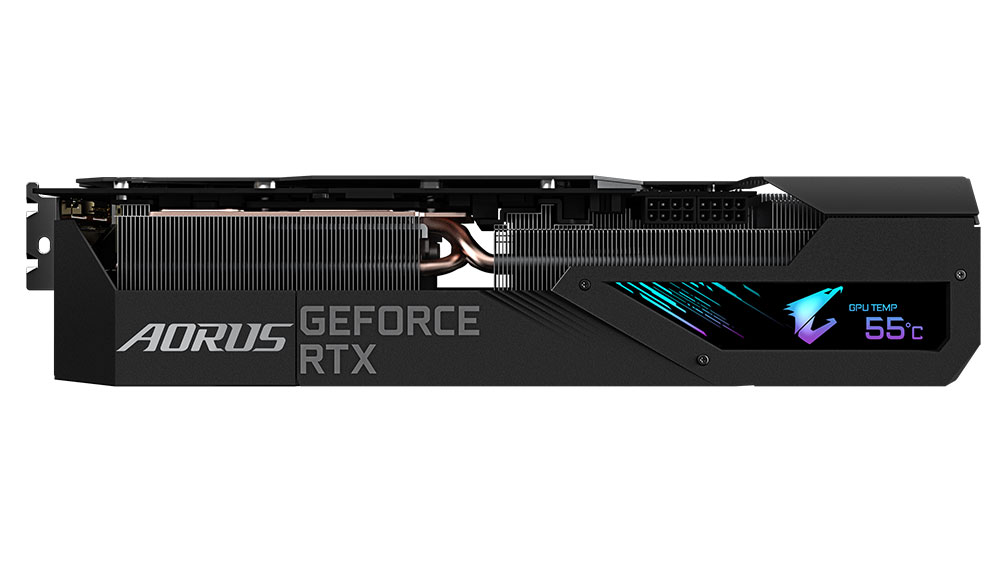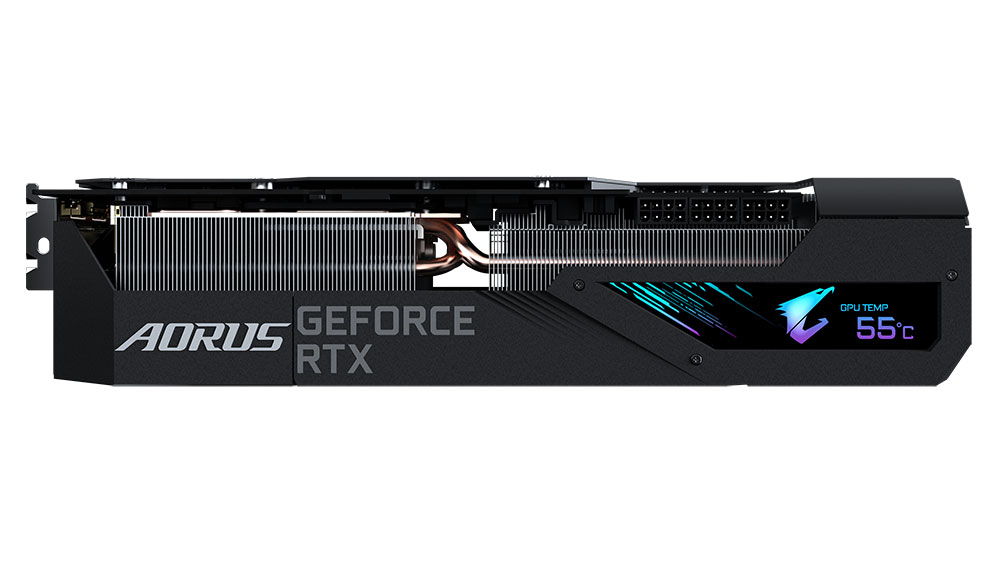Gigabyte Juices Up GeForce RTX 3080 With a Third 8-pin PCIe Connector
Gigabyte (via momomo_us) has apparently revised the company's Aorus GeForce RTX 3080 Master 10G (GV-N3080AORUS M-10GD) with a new power layout. The Revision 2.0 board, the spitting image of the prior revision, sports a third 8-pin PCIe power connector.
The GeForce RTX 3080, rated for 320W, makes do with a pair of 8-pin PCIe power connectors. Bearing in mind that the PCIe x16 slot provides 75W, a setup with two 8-pin PCIe power connectors provides power delivery up to 375W, more than sufficient for a GeForce RTX 3080. However, custom models with high factory overclocks typically sip more power, explaining the dependency on more PCIe power connectors.
In terms of pure performance, the Aorus GeForce RTX 3080 Master 10G sports a 1,845 MHz boost clock, approximately 7.9% higher than the boost clock on the Founders Edition model. The graphics card is the second-fastest SKU in Gigabyte's Ampere GeForce RTX 3080 product stack. It only lags behind the Aorus GeForce RTX 3080 Xtreme 10G, which flaunts a 1,905 MHz boost clock and has three 8-pin PCIe power connectors.


The previous revision of the Aorus GeForce RTX 3080 Master 10G only required two 8-pin PCIe power connectors. The revamped power design certainly calls for attention. We suspect that Gigabyte's decision was purely based on optimizing costs because the Aorus GeForce RTX 3080 Xtreme 10G and the Aorus GeForce RTX 3080 Master 10G are practically the same graphics card, sans the boost clock speed. By unifying both power layouts, Gigabyte could easily recycle GPUs that don't qualify for the Xtreme variant for the Master variant.
With the extra 8-pin PCIe power connector on the new revision, Gigabyte also raised the minimum power supply recommendation from 750W up to 850W. It remains to be seen whether Revision 2.0 will actually sip more, or the same amount, of power under normal circumstances. In any event, it shouldn't be a major issue unless you're running a power supply at the borderline capacity of what Gigabyte recommends.
We don't expect the first revision to be in ample circulation anymore. Performance should be identical on both revisions but, if you're set on adding the Aorus GeForce RTX 3080 Master 10G to your system, grab the new revisions just for peace of mind. We've reached out to Gigabyte for more information and will update as necessary.
Get Tom's Hardware's best news and in-depth reviews, straight to your inbox.

Zhiye Liu is a news editor, memory reviewer, and SSD tester at Tom’s Hardware. Although he loves everything that’s hardware, he has a soft spot for CPUs, GPUs, and RAM.
-
Bastard2k Im starting to feel a little ripped off with a first gen card that crashes in browsers unless i set the car to run at full pop or disable hardware acceleration. Im not convinced this is a hardware issue either but the silence from manufacturers, combined with these quietly re-designed cards is making me wonder.Reply -
escksu Dont understand why is there a need for so many power connectors. If anyone is using a PSU that just meets the specifications, they probably aren't going to use this card at all. The wires used be brands like seasonic are 18AWG which is good enough for 10A. 6 x12V wires total up 600W. (excluding 75W from PCIE connector).Reply -
InvalidError Reply
Simple: the PCI-SIG heavily under-rated cables and connectors to cover their asses in case some manufacturer decided to use horrible wires and connectors so we end up "needing" twice as many connectors as we should by connector manufacturers' specs. Another related reason would be that lower quality PSUs tend to have fewer cables to cut costs, so requiring more power cables reduces the likelihood of crappy PSUs getting paired with components they shouldn't be used with.escksu said:Dont understand why is there a need for so many power connectors. -
sharp10xD Reply
So basically there is no difference in rev 1.0 and rev 2.0. Both works identically same ? other I will make life of gigabyte Germany miserable for selling me rev 1.0 when they wanted to come up with rev 2.0 in just 2 months.InvalidError said:Simple: the PCI-SIG heavily under-rated cables and connectors to cover their asses in case some manufacturer decided to use horrible wires and connectors so we end up "needing" twice as many connectors as we should by connector manufacturers' specs. Another related reason would be that lower quality PSUs tend to have fewer cables to cut costs, so requiring more power cables reduces the likelihood of crappy PSUs getting paired with components they shouldn't be used with. -
InvalidError Reply
The main difference here appears to be that Gigabytes simply decided to reuse the same PCB between the Master v2 and Extreme to cut costs.sharp10xD said:So basically there is no difference in rev 1.0 and rev 2.0. Both works identically same ? -
sizzling ReplyBastard2k said:Im starting to feel a little ripped off with a first gen card that crashes in browsers unless i set the car to run at full pop or disable hardware acceleration. Im not convinced this is a hardware issue either but the silence from manufacturers, combined with these quietly re-designed cards is making me wonder.
Mines rock solid, that is not normal behaviour. -
thepersonwithaface45 Replysizzling said:Mines rock solid, that is not normal behaviour.
Nvidia released new drivers today so hopefully those get rid of some of the issues we're experiencing.
I get black screens so sporadically now that I can't pin down the cause. Going to do a safemode reinstall of windows, drivers, etc. if the new nvidia drivers don't fix it.
Thank god it's (almost) friday